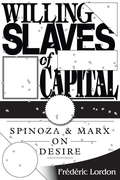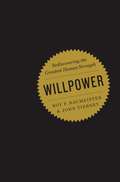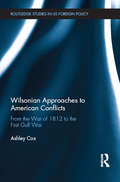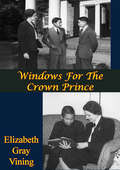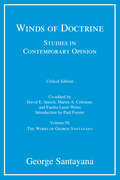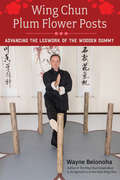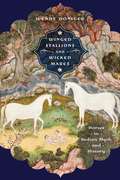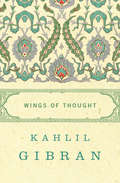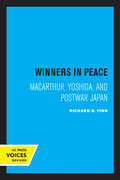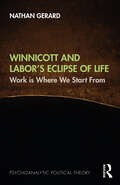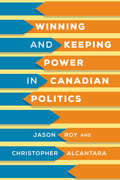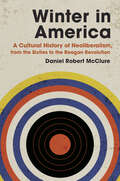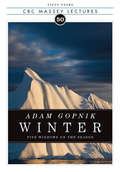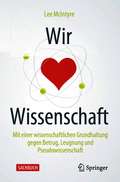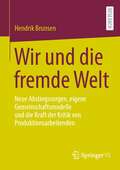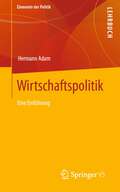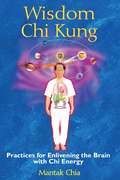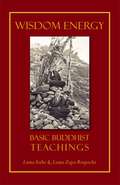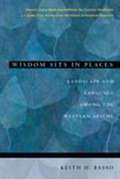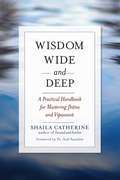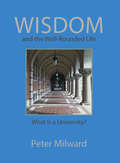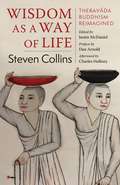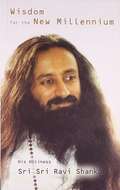- Table View
- List View
Willing Slaves Of Capital
by Frederic LordonWhy do people work for other people? This seemingly naïve question is at the heart of Lordon's argument. To complement Marx's partial answers, especially in the face of the disconcerting spectacle of the engaged, enthusiastic employee, Lordon brings to bear a "Spinozist anthropology" that reveals the fundamental role of affects and passions in the employment relationship, reconceptualizing capitalist exploitation as the capture and remolding of desire. A thoroughly materialist reading of Spinoza's Ethics allows Lordon to debunk all notions of individual autonomy and self-determination while simultaneously saving the ideas of political freedom and liberation from capitalist exploitation. Willing Slaves of Capital is a bold proposal to rethink capitalism and its transcendence on the basis of the contemporary experience of work.
Willpower: Rediscovering The Greatest Human Strength
by Roy F. Baumeister John TierneyOne of the world's most esteemed and influential psychologists, Roy F. Baumeister, teams with New York Times science writer John Tierney to reveal the secrets of self-control and how to master it. In Willpower, the pioneering researcher Roy F. Baumeister collaborates with renowned New York Times science writer John Tierney to revolutionize our understanding of the most coveted human virtue: self-control. In what became one of the most cited papers in social science literature, Baumeister discovered that willpower actually operates like a muscle: it can be strengthened with practice and fatigued by overuse. Willpower is fueled by glucose, and it can be bolstered simply by replenishing the brain's store of fuel. That's why eating and sleeping-- and especially failing to do either of those--have such dramatic effects on self-control (and why dieters have such a hard time resisting temptation). Baumeister's latest research shows that we typically spend four hours every day resisting temptation. No wonder people around the world rank a lack of self-control as their biggest weakness. Willpower looks to the lives of entrepreneurs, parents, entertainers, and artists--including David Blaine, Eric Clapton, and others--who have flourished by improving their self-control. The lessons from their stories and psychologists' experiments can help anyone. You learn not only how to build willpower but also how to conserve it for crucial moments by setting the right goals and using the best new techniques for monitoring your progress. Once you master these techniques and establish the right habits, willpower gets easier: you'll need less conscious mental energy to avoid temptation. That's neither magic nor empty self-help sloganeering, but rather a solid path to a better life. Combining the best of modern social science with practical wisdom, Baumeister and Tierney here share the definitive compendium of modern lessons in willpower. As our society has moved away from the virtues of thrift and self-denial, it often feels helpless because we face more temptations than ever. But we also have more knowledge and better tools for taking control of our lives. However we define happiness--a close-knit family, a satisfying career, financial security--we won't reach it without mastering self-control.
Wilsonian Approaches to American Conflicts: From the War of 1812 to the First Gulf War (Routledge Studies in US Foreign Policy)
by Ashley CoxThis book explores US foreign policy, specifically the history of America’s entry into the War of 1812, the First World War, the Korean War and the First Gulf War. Using a historical case study approach, it demonstrates how the Wilsonian Framework can give us a unique understanding of why the United States chose to go to war in those four conflicts. Cox argues that the Wilsonian Framework is an important concern for decision makers in the US and that democracy promotion and the concept of international law are driving factors in each of these decisions to go to war. The realist and economic explanations of these conflicts are not sufficient and we must draw on Wilsonianism to gain a clear understanding of these conflicts. Drawing on the history of American liberalism and the work of Walter Russel Mead and Tony Smith, the book presents a definition of Wilsonianism that represents a broad span of the history of The Republic, in order to show consistency across time. It also establishes why the realist and economic explanations fail to provide sufficient explanatory power and how the Wilsonian Framework can give important insights into these conflicts. This book will be of interest to international historians and international relations scholars at both postgraduate and scholar level. It will also be of use to those wishing to conduct future research into the motivations that drive the foreign and security policies of the United States.
Windows For The Crown Prince
by Elizabeth Gray Vining"We want you to open windows on to a wider world for our Crown Prince."--VISCOUNT MATSUDAIRAIn the ruins of Japan after World War II, the US forces engaged in the physical reconstruction of the country, but they and the Japanese hierarchy knew that the spiritual reconstruction of the country would also be of paramount importance. With the rejection by Emperor Hirohito of his divinity, the Crown Prince Akihito was the focus of the nation's hopes of renewal, however, he was a child in 1945. In order to combat insularism and xenophobia, a foreign tutor was decided upon. Mrs. Elizabeth Gray Vining, a noted children's author and Quaker was decided upon. In this book Mrs. Vining provides a fascinating look at the Imperial Court and her guidance of the future Emperor from a chubby child to a poised, attractive youth with a high sense of responsibility.
Winds of Doctrine, critical edition, Volume 9: Studies in Contemporary Opinion (The Works of George Santayana)
by George SantayanaA critical edition of a classic work by the renowned philosopher George Santayana evaluating key movements in American intellectual history.Winds of Doctrine presents six essays by the internationally recognized critic and philosopher George Santayana. The essays, edited by David E. Spiech, Martin A. Coleman, and Faedra Lazar Weiss, and introduced by Paul Forster, address the broad sweep of intellectual trends—or, as the title suggests, the ever-changing winds of thought—of the Spanish-born American thinker&’s time. The topics range from the secularization of American culture to the rise of religious modernism to the &“genteel tradition&” in American philosophy, the subject of Santayana&’s final lecture in America and perhaps his best known essay. The original Winds of Doctrine, published in 1913, was the first book published after Santayana&’s 1912 departure for Europe. Santayana had felt stifled at Harvard for some time, and his long-contemplated resignation from academia released him from previous obligations and allowed him a new freedom to think and write. Much later, Santayana remarked on the significance of that choice to step away: &“In Winds of Doctrine and my subsequent books, a reader of my earlier writings may notice a certain change of climate. . . . It was not my technical philosophy that was principally affected, but rather the meaning and status of philosophy for my inner man.&”An insightful document of American intellectual history, supplemented with annotations and rich textual commentary, Winds of Doctrine is a vital and engaging survey of the religious, political, philosophical, and literary trends of the twentieth century.
Wing Chun Plum Flower Posts: Advancing the Legwork of the Wooden Dummy
by Wayne BelonohaApply and defend against all manner of kicks, sweeps, leg locks, leg checks and kick checks by learning to master the lost study of plum flower posts.It's time to rediscover the forgotten secrets to harnessing and wielding the power of the plum flower posts in combat. The missing link for training the Wing Chun stance, this book helps intermediate students and practitioners reach the highest levels of proficiency, teaching leg skills, sticking skills, good positioning, and checking and immobilization skills.The plum flower posts consist of 11 posts--10 wooden gerk jong, or legwork posts, and one mok yan jong, or wooden man post. Together, they complete a set called the moy fa jong. The wooden dummy trains practitioners to protect the upper centerline by applying hard techniques with proper distance, position, and leg control, while the gerk jong are designed and placed to train all elements of legwork and manage the lower centerline.A valuable training tool for any and all styles and families of Wing Chun, mastering the posts ensures that you never lose a fight due to lost balance or bad positioning; fall from leg sweeps, leg locks, or leg checks; or miss the knockout because of poor distance or knockout power. Comprehensively written and supplemented with 180 full-color illustrations and photos, Wing Chun Plum Flower Posts is an essential resource for Wing Chun students, practitioners, and teachers looking to expand their knowledge base and skill set.
Winged Stallions and Wicked Mares: Horses in Indian Myth and History (Richard Lectures)
by Wendy DonigerAlong the way, we encounter the tensions between Hindu stallion and Arab mare traditions, the imposition of European standards on Indian breeds, the reasons why men ride mares to weddings, the motivations for murdering Dalits who ride horses, and the enduring myth of foreign horses who emerge from the ocean to fertilize native mares.
Wings of Thought
by Kahlil GibranA critical exploration of the life&’s work of one of the twentieth century&’s most important philosophers and poets, Kahlil Gibran Through his fiction, essays, poems, and art, Kahlil Gibran inspired a devoted international following and transformed modern Arabic literature. In this book, Joseph P. Ghougassian brings together the philosophical elements present across Gibran&’s diverse writings, including his bestselling work The Prophet, as well as other significant works such as The Broken Wings, which tells the story of doomed young lovers, and the collection of aphorisms in Sand and Foam. Excerpts from Gibran&’s letters provide a window into his mind, heart, and soul, creating a biography of this groundbreaking, mystical writer unlike any other. This systematic collection introduces Gibran as a &“people&’s philosopher,&” who used simple, straightforward language to reveal a worldview of rich, deep meaning.
Winners in Peace: MacArthur, Yoshida, and Postwar Japan
by Richard B. FinnSingular for its breadth and balance, Winners in Peace chronicles the American Occupation of Japan, an episode that profoundly shaped the postwar world. Richard B. Finn, who participated in the Occupation as a young naval officer and diplomat, tells the full story of the activities from 1945 to 1952. He focuses on the two main actors, General Douglas MacArthur and Japanese Prime Minister Shigeru Yoshida, and details the era's major events, programs, and personalities, both American and Japanese. Finn draws on an impressive range of sources—American, Japanese, British, and Australian—including interviews with nearly one hundred participants in the Occupation. He describes the war crimes trials, constitutional reforms, and American efforts to rebuild Japan. The work of George Kennan in making political stability and economic recovery the top goals of the United States became critical in the face of the developing Cold War.Winners in Peace will aid our understanding of Japan today—its economic growth, its style of government, and the strong pacifist spirit of its people. This title is part of UC Press's Voices Revived program, which commemorates University of California Press’s mission to seek out and cultivate the brightest minds and give them voice, reach, and impact. Drawing on a backlist dating to 1893, Voices Revived makes high-quality, peer-reviewed scholarship accessible once again using print-on-demand technology. This title was originally published in 1992.
Winnicott and Labor’s Eclipse of Life: Work is Where We Start From (Psychoanalytic Political Theory)
by Nathan GerardNathan Gerard draws upon the pathbreaking insights of a pediatrician and psychoanalyst D. W. Winnicott to offer a new set of ideas in the novel domain of contemporary work life and its discontents. Locating Winnicott within a broad landscape of critical scholarship that dissects work’s perils, the book positions Winnicott as both a radical critic and creative advocate for building a different kind of work life—one that might make room for the presence of self. By shuffling the discourse on neoliberal subjectivity to reclaim what Winnicott calls “unit status” of the separate self, Gerard differentiates Winnicott from the relational tradition by advocating for Winnicott’s non-relational aspects. Through such analysis, the book reveals how work and home have become two sides of the same impoverished coin, each contributing to a legitimately “bad environment” that perpetuates self-absence and annihilates one’s unique sense of “feeling real” and alive. Winnicott and Labor’s Eclipse of Life will be of interest to readers of Winnicott and psychoanalysis, organization and management studies, and anyone hoping to deepen their engagement with the dynamics of contemporary work life.
Winning and Keeping Power in Canadian Politics
by Christopher Alcantara Jason RoyDo negative campaigns win elections? Do voters abandon candidates accused of scandalous behaviour? Do government apologies affect prospects for re-election? While many people assume the answer to each of these questions is yes, there is limited empirical evidence to support these assumptions. In this book, Jason Roy and Christopher Alcantara use a series of experiments to test these and other commonly held beliefs. Each chapter draws upon contemporary events and literature to frame the issues and strategies. The findings suggest that not all of the assumptions that people have about the best strategies for winning and keeping political power hold up to empirical scrutiny. In fact, some work in ways that many readers may find surprising. Original and innovative in its use of experimental methods, Winning and Keeping Power in Canadian Politics is a persuasive analysis of some of our most prominent and long-standing political myths. It will be a "go to" resource for journalists, strategists, scholars, and general readers alike.
Winter in America: A Cultural History of Neoliberalism, from the Sixties to the Reagan Revolution
by Daniel Robert McClureNeoliberalism took shape in the 1930s and 1940s as a transnational political philosophy and system of economic, political, and cultural relations. Resting on the fundamental premise that the free market should be unfettered by government intrusion, neoliberal policies have primarily redirected the state's prerogatives away from the postwar Keynesian welfare system and toward the insulation of finance and corporate America from democratic pressure. As neoliberal ideas gained political currency in the 1960s and 1970s, a&8239;reactionary cultural turn&8239;catalyzed their ascension. The cinema, music, magazine culture, and current events discourse of the 1970s provided the space of negotiation permitting these ideas to take hold and be challenged.Daniel Robert McClure's book follows the interaction between culture and economics during the transition from Keynesianism in the mid-1960s to&8239;the&8239;triumph of&8239;neoliberalism at the dawn of the 1980s. From the 1965 debate between William F. Buckley and James Baldwin, through the pages&8239;of BusinessWeek and Playboy, to the rise of exploitation cinema in the 1970s, McClure tracks the increasingly shared perception by white males that they had "lost" their long-standing rights and that a great neoliberal reckoning might restore America's repressive racial, sexual, gendered, and classed foundations in the wake of&8239;the 1960s.
Winter: Five Windows on the Season (The CBC Massey Lectures #2011)
by Adam GopnikThe 2011 CBC Massey Lectures celebrates fifty years with bestselling author, essayist, cultural observer, and famed New Yorker contributor Adam Gopnik, whose subject is winter -- the season, the space, the cycle. Gopnik takes us on an intimate tour of the artists, poets, composers, writers, explorers, scientists, and thinkers, who helped shape a new and modern idea of winter. Here we learn how a poem by William Cowper heralds the arrival of the middle class; how snow science leads to existential questions of God and our place in the world; how the race to the poles marks the human drive to imprint meaning on a blank space. Gopnik’s kaleidoscopic work ends in the present day, when he traverses the underground city in Montreal, pondering the future of Northern culture. A stunningly beautiful meditation buoyed by Gopnik’s trademark gentle wit, Winter is at once an enchanting homage to an idea of a season and a captivating journey through the modern imagination. This deluxe 50th anniversary edition includes full-colour images printed on two 8-page inserts.
Wir lieben Wissenschaft: Mit einer wissenschaftlichen Grundhaltung gegen Betrug, Leugnung und Pseudowissenschaft
by Lee MclntyreAngriffe auf die Wissenschaft sind alltäglich geworden: Die Erforschung des Klimawandels sei keine „anständige“ Wissenschaft, die Evolution „nur eine Theorie“, die „Wahrheit“ über Impfstoffe werde vertuscht. In diesem Buch diskutiert Lee McIntyre, was Wissenschaft von Nicht-Wissenschaft unterscheidet: der Stellenwert der Evidenz und die Bereitschaft, Theorien auf Basis neuer Evidenz zu verwerfen. Diese beiden wesentlichen Eigenschaften nennt er die „wissenschaftliche Grundhaltung“. McIntyre führt Beispiele an, die sowohl den wissenschaftlichen Erfolg (eine Verringerung des Kindbettfiebers im 19. Jahrhundert) als auch das Scheitern (die fehlerhafte „Entdeckung“ der kalten Fusion im 20. Jahrhundert) veranschaulichen. Er beschreibt den Wandel der Medizin von einer weitgehend auf Vermutungen beruhenden Praxis zu einer Wissenschaft, die sich auf Beweise stützt; er betrachtet wissenschaftlichen Betrug und untersucht die Positionen von ideologiegetriebenen Leugnern, Pseudowissenschaftlern und „Skeptikern“, die wissenschaftliche Erkenntnisse ablehnen.Das Buch macht in einer Welt der „alternativen Fakten“ klar, dass die Beachtung von Fakten ein einzigartig wirkungsvolles Instrument zur Verteidigung der Wissenschaft selbst ist.
Wir und die fremde Welt: Neue Abstiegssorgen, eigene Gemeinschaftsmodelle und die Kraft der Kritik von Produktionsarbeitenden
by Hendrik BrunsenDie Studie schaut mit einem pragmatischen Forschungsansatz in einen Leuchtturmbetrieb der Metall- und Elektrobranche und beschäftigt sich mit einer Formation indirekter Leistungssteuerung, die auf dem Argument einer betrieblichen Gemeinschaft aufbaut. Für die Arbeitenden, so der Ausgangspunkt, ist das auf einer Standort- und Arbeitsplatzunsicherheit basierende Gemeinschaftsargument einerseits plausibel. Andererseits bringen sie aber auch Zweifel zur Sprache. Erforscht wird entlang der Kritik der Arbeitenden, wie die Zweifel begründet werden und welche Folgen sie haben. Grundlage der Kritik sind zwei eigene Gemeinschaftsmodelle, die von den normativen Gemeinschaftsprinzipien des Zusammenhalts und der Arbeitsteilung angeleitet werden und den Arbeitenden zu kompetenten Urteilen verhelfen. Von diesen normativen Standpunkten aus diagnostizieren die Arbeitenden eine Entwertung von Produktionsarbeit, welche das Gemeinschaftsargument aus ihrer Perspektive konterkariert und zu neuen sozialen Abstiegssorgen führt. Überzeugt von der Richtigkeit und Angemessenheit der eigenen Gemeinschaftsmodelle sowie zwecks Bearbeitung der Abstiegssorgen stellen die Arbeitenden der diagnostizierten Entwertung anschließend eine praktische Aufwertung als Produktionsexperten entgegen.
Wirtschaftspolitik: Eine Einführung (Elemente der Politik)
by Hermann AdamDas Buch bietet eine knappe Einführung in die Ziele und Zielkonflikte sowie die Akteure der Wirtschaftspolitik. Es stellt die wichtigsten ökonomischen Steuerungsinstrumente und den komplizierten politischen Entscheidungs- und Abstimmungsprozess bei wirtschaftspolitischen Fragen dar. Besonderer Wert wird auf die Analyse der in diesem Politikfeld verfolgten kontroversen Interessen gelegt. Am Schluss werden die Grenzen nationaler Wirtschaftspolitik im Zeitalter der Globalisierung aufgezeigt. Weiterführende Literaturhinweise erleichtern einen vertieften Einstieg in das komplexe Thema.
Wisdom Chi Kung: Practices for Enlivening the Brain with Chi Energy
by Mantak ChiaTaoist meditation practices for increasing and maintaining mental awareness, memory, and clarity • Details techniques to increase the level of chi energy in the brain • Explains how to synchronize the left and right brain by activating the body’s energetic potentials • Shows that by emptying the mind there is more energy to heal the body Wisdom Chi Kung teaches practitioners how to revitalize the brain: to repair function, increase memory, and expand capacity. Every day we use up so much of our brain’s capacity to function that we have very little left at the end of the day. By thinking or worrying too much, the brain can use up to 80 percent of the body’s entire energy reserve. Learning to stop the brain, to empty the mind from the ceaseless chatter of the “monkey mind,” and then recharge it with chi energy can increase our mental capacity, focus, and clarity. Using the Inner Smile meditation technique, practitioners learn how to recharge chi energy for the brain in a form that is most useful. Practitioners smile and empty the mind into the lower tan tien and the organs. The organs then transform this chi energy. When the mind is empty, the energy transformed by the organs is sent back to the brain to revitalize it. This process synchronizes the left and right brain by activating and tapping in to the body’s energetic potentials. As the mind continues to empty, receive, and also enhance the transformed chi energy, it is able to open itself to connect with universal chi energies and fill the body with enhanced life force.
Wisdom Energy
by Jonathan Landaw Lama Thubten Zopa Rinpoche Lama Thubten Yeshe Alexander BerzinWisdom Energy is a simple and compelling introduction to Buddhism by two Tibetan lamas renowned for their insight and skill in teaching Westerners. Containing an entire meditation course, it goes to the heart of basic Buddhist practice and discusses the meaning and purpose of meditation, the causes of dissatisfaction and unhappiness, and the methods for subduing them and gaining control over our minds and lives. Originally published in 1976, Wisdom Energy still preserves the power, humor, and directness of the lamas's first teaching tour of North America, giving the reader the feeling of an intimate audience with two highly respected teachers.
Wisdom Sits In Places: Landscapes and Language Among the Western Apache
by Keith H. BassoFour essays recount stories Western Apaches tell about the landscape. Includes comments from a cultural anthropologist.
Wisdom Wide and Deep
by Pa-Auk Sayadaw Shaila CatherineWisdom Wide and Deep is a comprehensive guide to an in-depth training that emphasizes the application of concentrated attention (jhana) to profound and liberating insight (vipassana). With calm, tranquility, and composure established through a practical experience of jhana meditators are able to halt the seemingly endless battle against hindrances, eliminate distraction, and facilitate a penetrative insight into the subtle nature of matter and mind. It was for this reason the Buddha frequently exhorted his students, Wisdom Wide and Deep follows and amplifies the teachings in Shaila Catherine's acclaimed first book, Focused and Fearless: A Meditator's Guide to States of Deep Joy, Calm, and Clarity. Readers will learn to develop this profound stability, sustain an in-depth examination of the nuances of mind and matter, and ultimately unravel deeply conditioned patterns that perpetuate suffering. This fully detailed manual for the mind sure to become a trusted companion to many inner explorers.
Wisdom Won from Illness
by Jonathan LearCan reason absorb the psyche’s nonrational elements into a conception of the fully realized human being? Without a good answer to that question, Jonathan Lear says, philosophy is cut from its moorings in human life. He brings into conversation psychoanalysis and moral philosophy, which together form a basis for ethical thought about how to live.
Wisdom and the Well-Rounded Life
by Peter MilwardReflecting on the pursuit of knowledge and wisdom in higher education and in life, this thoughtful treatise considers the roots and philosophical underpinnings of university education. Examining such subjects as philosophy, science, nature, art, religion, and finding one's place in the world, Peter Milward shares his sage thoughts on obtaining a well-rounded base of knowledge.Peter Milward is a Jesuit priest and literary scholar. He is professor emeritus of English literature at Sophia University in Tokyo, where he was director of the Renaissance Centre and a leading figure in scholarship on English Renaissance literature.
Wisdom as a Way of Life: Theravāda Buddhism Reimagined
by Steven CollinsThis wide-ranging and powerful book argues that Theravāda Buddhism provides ways of thinking about the self that can reinvigorate the humanities and offer broader insights into how to learn and how to act. Steven Collins argues that Buddhist philosophy should be approached in the spirit of its historical teachers and visionaries, who saw themselves not as preservers of an archaic body of rules but as part of a timeless effort to understand what it means to lead a worthy life. He contends that Buddhism should be studied philosophically, literarily, and ethically using its own vocabulary and rhetorical tools. Approached in this manner, Buddhist notions of the self help us rethink contemporary ideas of self-care and the promotion of human flourishing.Collins details the insights of Buddhist texts and practices that promote the ideal of active and engaged learning, offering an expansive and lyrical reflection on Theravāda approaches to meditation, asceticism, and physical training. He explores views of monastic life and contemplative practices as complementing and reinforcing textual learning, and argues that the Buddhist tenet that the study of philosophy and ethics involves both rigorous reading and an ascetic lifestyle has striking resonance with modern and postmodern ideas. A bold reappraisal of the history of Buddhist literature and practice, Wisdom as a Way of Life offers students and scholars across the disciplines a nuanced understanding of the significance of Buddhist ways of knowing for the world today.
Wisdom for the New Millennium
by Sri Sri Ravi ShankarA book by Indian Spiritual Guru Sri Sri Ravishankar, it is a book for self improvement as well and talks about how to live a happy stress free life.
